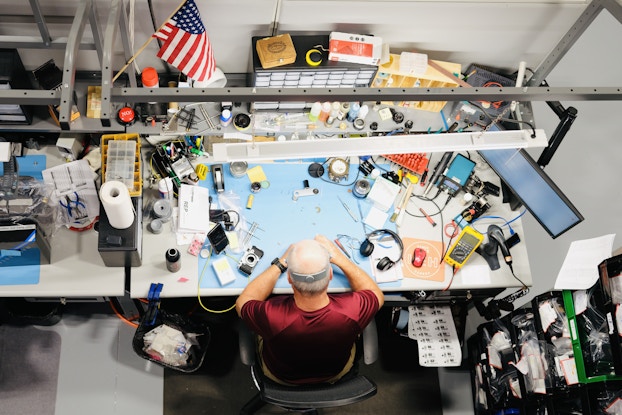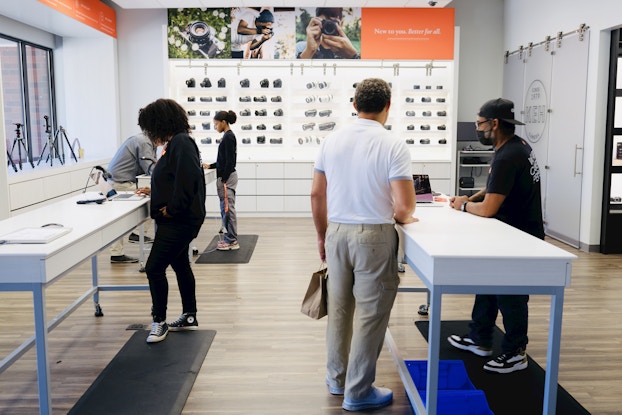
Why it matters:
- KEH is a 46-year-old camera company that has evolved into a model for the new age of resale, with its certified, branded, technical re-commerce business.
- The company does over $100 million in sales annually and puts over 275,000 pieces of photo and video gear back in circulation each year.
- Consumer interest in resale is skyrocketing, with U.S. sales of secondhand apparel up 14% in 2024 and expected to top $40 billion by 2029, for example. That trend is expanding beyond apparel, and KEH is tapping into that.
KEH Camera, the country’s largest reseller of pre-owned camera equipment, was doing re-commerce long before there was e-commerce.
The Georgia-based business was born in 1979 and originally used print catalogs to reach customers, most of whom placed orders by phone or in person in the company store in Atlanta.
Now, KEH connects with customers around the world through its e-commerce site and has grown into a leading seller and purchaser of pre-owned camera and video equipment.
While focusing on the future, it has maintained and nurtured the foundational elements that fueled its early growth, including its Atlanta store and headquarters, where photography experts inspect, repair, and price photography equipment.
In recent years, it has seen how smartphones, which have put cameras and video cameras in everyone’s pockets, have driven increased demand for high-end, professional equipment.
“In a world where everything is images, we sell better equipment that helps people who want to stand out and differentiate themselves, personally and professionally,” Glenn Kaufman, KEH’s CEO, told CO—.
Smartphones have turned out to be beneficial for the sales of professional-grade cameras and lenses, Kaufman said, despite the common perception that they made cameras obsolete.
The iPhone, he said, “is the gateway entry vehicle for this market. Nobody is scared of taking pictures or videos anymore. It’s part of their life.”
“It used to be that very few people actually took pictures or videos. Now, everybody takes pictures and videos and the way to distinguish yourself is by using better equipment,” Kaufman said.
The digital camera market is projected to grow to $12.4 billion worldwide by 2032, up 50% over 2023, according to market research company SNS Insider.
A report by SNS Insider attributed the steady growth in the category to heightening demand for high-end imaging solutions across multiple industries, including content creation and vlogging.

KEH rides the resale boom
KEH’s more recent success comes as resale emerges as one of the fastest growing segments of the U.S. retail economy, fueled by the appeal of affordability amid economic uncertainty, as well as consumers’ interest in sustainable shopping, particularly in the case of younger consumers. The rise of online resale platforms is also fueling growth as the secondhand goods market moves beyond apparel, gaining traction in electronics, home goods, jewelry, and other categories.
What’s more, technology advances are making it easier for brands and individuals to sell secondhand and for consumers to buy, said Brian Ehrig, Partner in the consumer practice at Kearney. “It’s really only been in recent years that these more tech-enabled platforms have come in and really helped make it easy to [unlock] all the extra things that you have in your closet,” Ehrig told CO— in May 2025.
[Read more: Resale’s Next Big Wave: Execs From ThredUp to Trove on How Tech and Brand Adoption Are Driving Secondhand Retail Boom]
A business that started as a hobby
KEH started as the founder’s hobby and quickly became the largest purchaser of used cameras in the country.
Founder King Grant Jr. began collecting cameras in the early 1970s, but after deciding he was spending too much time on that hobby, he sold his collection, using ads in a photography magazine.
Grant kept the names and addresses of the roughly 400 people he sold his cameras to, and several years later, when he was looking to start a business and decided to try buying and selling cameras, he had a mailing list ready to go. The business was named after the initials of his three children, King, Eleanor, and Hugh.
It used to be that very few people actually took pictures or videos. Now, everybody takes pictures and videos and the way to distinguish yourself is by using better equipment.Glenn Kaufman, CEO of KEH Camera
The company created its first website in 1996, but customers had to order by phone until 1999, when KEH launched a new website that could handle e-commerce sales.
The company in 2013 sold a majority stake to D Cubed Group, a New York–based private investment firm that invests in profitable small- and mid-size businesses.
Kaufman, who is Managing Director of D Cubed in addition to being CEO of KEH, said the investment firm was attracted to the opportunity to create a certified, pre-owned business model for technical products.
Transitioning from used to certified pre-owned with a ‘better than new’ edge
Just as the certified, pre-owned model revolutionized the used car business, KEH was well-positioned to do that in the technical category of high-end camera and video equipment, Kaufman said.
Pre-owned “makes sense for a tremendous number of technical products,” he said. “They should be used multiple times, and they can best be used multiple times when somebody is in the middle [at KEH] who understands the products really well and who can earn the trust of consumers so people will want to sell to them, and people will feel good and safe buying from them.”
“We found the largest player in the used camera space, invested in it, and set out to transition it into being a certified, pre-owned business, where the products were inspected, the products were graded, the products were warrantied,” he said.
“We call this branded, technical re-commerce,” Kaufman said. High-end cameras and lenses fall into a category where customers need to know that a pre-owned item works, and that the company that resells it stands behind it, he said.
The KEH marketing slogan is “Better than new.”
“It’s better for your wallet, it’s better for the environment, and it’s better than new,” Kaufman said.
“You can buy a product that’s essentially the same product that’s for sale brand new. It comes fully warrantied from a 50-year-old company that’s been doing this for that long, and you can get it for 30, 35, 40 percent less. It’s just smart, right?” he said.
Since becoming the controlling owner of KEH, D Cubed has focused on “upping the value add of what we provide behind a certified pre-owned product,” Kaufman said.
That includes investing in customer service and support, and having experts that can inspect products, repair all kinds of photo and video equipment, and improve the customer experience.
[Read more: 5 Consumer Trends Shaping Spending Patterns in 2025]

Profitability is ‘a sign the model works’
KEH has approximately 250 employees and has been profitable since before the D Cubed acquisition.
That sets KEH apart from other resale companies born in the digital age that have struggled to attain and maintain profitability. Luxury good reseller The RealReal was founded in 2011, went public in 2019, but didn’t report profits until the first quarter of 2023. Online clothing reseller ThredUp, which went public in 2021, has not yet achieved profitability.
When D Cubed looks at potential acquisitions, profitability is important, Kaufman said.
“Our approach to business is very straightforward. We’re going to build companies that succeed, and we’re going to build them in a way that makes them durable. And being a profitable company is an obvious sign that the model works,” he said.
“We invest in very few things for long periods of time, and we are very engaged in the spirit of building them as opposed to just treating them as financial transactions.”
CO— aims to bring you inspiration from leading respected experts. However, before making any business decision, you should consult a professional who can advise you based on your individual situation.
CO—is committed to helping you start, run and grow your small business. Learn more about the benefits of small business membership in the U.S. Chamber of Commerce, here.

What can membership do for your business?
Gain tools to stay informed, competitive, and connected by becoming a U.S. Chamber of Commerce member. Membership gives you direct access to expert policy insights, economic updates, and exclusive resources designed to help your business thrive. From behind-the-scenes analysis from D.C. to exclusive discounts and expert support, U.S. Chamber membership helps you navigate change and seize new opportunities.







